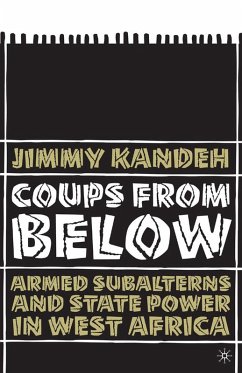Coups from Below represents the first major effort at studying coups carried out by the lumpen section or the subalterns of the armed forces of African states. No previous study has attempted to examine coup making by those in the bottom ranks of the military as a distinct pattern of intervention in African studies. Kandeh examines this pattern as broadly symptomatic of state failure, especially the inability of political leaders to institutionalize power, eradicate mass poverty and promote socioeconomic development.
Dieser Download kann aus rechtlichen Gründen nur mit Rechnungsadresse in A, B, BG, CY, CZ, D, DK, EW, E, FIN, F, GR, HR, H, IRL, I, LT, L, LR, M, NL, PL, P, R, S, SLO, SK ausgeliefert werden.
Hinweis: Dieser Artikel kann nur an eine deutsche Lieferadresse ausgeliefert werden.









